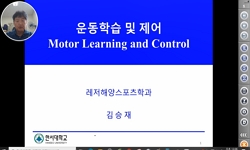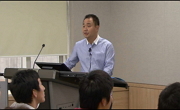Objective : To report the effects of a specific intervention, the Interactive Metronome® (IM), on timing, attention and motor function of a children with ADHD. Methods : The study is case reports about two boys with ADHD. One boy who is born 2008 is ...
http://chineseinput.net/에서 pinyin(병음)방식으로 중국어를 변환할 수 있습니다.
변환된 중국어를 복사하여 사용하시면 됩니다.
- 中文 을 입력하시려면 zhongwen을 입력하시고 space를누르시면됩니다.
- 北京 을 입력하시려면 beijing을 입력하시고 space를 누르시면 됩니다.

상호작용식 메트로놈(Interactive Metronome: IM)이 타이밍과주의력, 운동기능에 미치는 영향: 사례보고 = Effect of Interactive Metronome® Training on Timing, Attention and Motor Function of Children With ADHD : Case Report
한글로보기https://www.riss.kr/link?id=A101679141
- 저자
- 발행기관
- 학술지명
- 권호사항
-
발행연도
2015
-
작성언어
Korean
-
주제어
주의력결핍과잉행동 ; 주의력 ; ADHD ; attnetion ; Interactive Metronome®(IM) ; motor control ; timing ; 운동기능 ; 상호작용식 메트로놈(IM) ; 타이밍
-
KDC
514.22
-
등재정보
KCI등재후보
-
자료형태
학술저널
- 발행기관 URL
-
수록면
63-73(11쪽)
-
KCI 피인용횟수
10
- DOI식별코드
- 제공처
-
0
상세조회 -
0
다운로드
부가정보
다국어 초록 (Multilingual Abstract)
Objective : To report the effects of a specific intervention, the Interactive Metronome® (IM), on timing, attention and motor function of a children with ADHD. Methods : The study is case reports about two boys with ADHD. One boy who is born 2008 is attending general elementary school as a first year student (case 1), and another boy who is born 2001 is attending general elementary school as a second year student (case 2). For each case subject, IM training was provided during 3 weeks, from January 2015 to Febrary 2015. Evaluations were performed pre- and post-intervention in order to exam timing, attention and motor skills. The measurements uses in this study are Long Form Assessment (LFA) for the timing, RehaCom screening module for the attention, and Bruininks-Oseretsky Test of Morot Proficiency, second version (BOT-2) for the motor function. Results : The timing function was improved in both cases since both showed reduced response time for all motor tasks of LFA. In terms of attention, case 1 showed improvement of visual attention division, neglect and response Inhibition, and case 2 showed improvement of sustained attention. Lastly, in the BOT-2, case 1 showed improved the percentile rank of short (from 42%ile to 96%ile), and case 2 also showed similar improvement (from 21%ile to 66%ile). Conclusion : This study provides positive evidence that the Interactive Metronome® training has positive power to facilitate several body functions such as timing, attention and motor control of children with ADHD, through two case studies.
국문 초록 (Abstract)
목적 : Interactive Metronome(IM) 훈련프로그램이 ADHD 아동의 타이밍과 주의력 그리고 운동기능에 미치는영향을 사례보고 하고자 한다. 연구방법 : ADHD진단을 받은 일반초등학교 1학년에 재학 중인 ...
목적 : Interactive Metronome(IM) 훈련프로그램이 ADHD 아동의 타이밍과 주의력 그리고 운동기능에 미치는영향을 사례보고 하고자 한다. 연구방법 : ADHD진단을 받은 일반초등학교 1학년에 재학 중인 2008년생 남아(사례1)와 일반중학교 2학년에 재학중인 2001년생 남아(사례2)를 대상으로 2015년 1월 12일부터 2월 6일까지 4주간 IM 훈련프로그램을 적용하였다. 본 연구에서는 IM Pro 9.0을 이용하여 타이밍 향상을 위한 중재로 사용하였다. 총 3주간, 주 5회, 총 15회기, 회기 당 50-60분간 적용하였다. 또한 IM 훈련프로그램의 중재 효과를 알아보기 위해 중재 전후에 타이밍, 주의력, 운동기능을 평가하였는데 평가 도구로는 타이밍 향상을 평가하기 위해 IM의 Long Form Assessment(LFA) 를 사용하였다. 주의력을 평가하기 위해 Rhehacom 판별 검사(RehaCom screening module)를 사용하였고, 운동기능을 평가하기 위해 Bruininks–Oseretsky Test of Motor Proficiency 2판(BOT-2)를 사용하였다. 결과 : LFA의 타이밍 능력의 평가 결과는 사례 아동 모두에서 전체 운동과제의 평균 반응 속도가 감소되어 타이밍기능이 향상되었음을 알 수 있었다. 주의력은 사례1 아동에서 시각적 분리 주의력(visual attention division), 편측무시(neglect) 그리고 충동 조절(response inhibition) 기능이 향상되었고. 사례2 아동에서는 지속적 주의력(sustained attention) 기능이 향상되었다. 운동기능은 BOT-2 단축폼(short form)의 백분위(%ile Rank)가 사례1 아동은 42%ile에서 96%ile로 향상되었고, 사례2 아동은 21%ile에서 66%ile로 향상되었다. 두 사례 아동 모두양측 협응(bilateral coordination)항목과 상지 협응(upper-limb coordination)항목의 등가연령이 향상되었다. 결론 : 본 사례보고는 IM 훈련프로그램이 ADHD 아동의 타이밍, 주의력, 운동기능에 긍정적 효과가 있음을 시사한다.
참고문헌 (Reference)
1 Libkuman, T. M., "Training in timing improves accuracy in golf" 129 (129): 77-96, 2002
2 Kuhlman, K., "Timing in child development. High/Scope Educational Research Foundation" High/Scope Press 1999
3 Greenspan, S. I., "The growth of the mind origins of intelligence the endangered" Addison-Wesley Longman 1997
4 Cassily, J. F., "The Interactive Metronome®: A new computer-based technology to measure and improve timing, rhythmicity, motor planning, sequencing and cognitive capabilities" 2001
5 Choi, J. H., "Study on validity of the Korean Bruininks-Oseretsky Test of Motor Proficiency, 2nd ed" Inje University 2010
6 Diamond, S. J., "Processing speed and motor planning: The scientific background to the skill trained by interactive metronome technology" University of British Columbia 2003
7 Melinda, L. B., "Interactive metronome training for a 9-year-old boy with attention and motor coordination difficulties" 21 (21): 257-269, 2005
8 Cosper, S. M., "Interactive Metronome training in children with attention deficit developmental coordination disorders" 32 (32): 331-336, 2009
9 Taub, G. E., "Improvements in interval time tracking and effects on reading achievement" 44 (44): 849-863, 2007
10 Seok, I. S., "Effects of behavioral characteristics and learning abilities through interactive metronome training on children with ADHD" Daegu University 2009
1 Libkuman, T. M., "Training in timing improves accuracy in golf" 129 (129): 77-96, 2002
2 Kuhlman, K., "Timing in child development. High/Scope Educational Research Foundation" High/Scope Press 1999
3 Greenspan, S. I., "The growth of the mind origins of intelligence the endangered" Addison-Wesley Longman 1997
4 Cassily, J. F., "The Interactive Metronome®: A new computer-based technology to measure and improve timing, rhythmicity, motor planning, sequencing and cognitive capabilities" 2001
5 Choi, J. H., "Study on validity of the Korean Bruininks-Oseretsky Test of Motor Proficiency, 2nd ed" Inje University 2010
6 Diamond, S. J., "Processing speed and motor planning: The scientific background to the skill trained by interactive metronome technology" University of British Columbia 2003
7 Melinda, L. B., "Interactive metronome training for a 9-year-old boy with attention and motor coordination difficulties" 21 (21): 257-269, 2005
8 Cosper, S. M., "Interactive Metronome training in children with attention deficit developmental coordination disorders" 32 (32): 331-336, 2009
9 Taub, G. E., "Improvements in interval time tracking and effects on reading achievement" 44 (44): 849-863, 2007
10 Seok, I. S., "Effects of behavioral characteristics and learning abilities through interactive metronome training on children with ADHD" Daegu University 2009
11 Shaffer, R. J., "Effect of interactive metronomeⓇ training on children with ADHD" 55 (55): 155-162, 2001
12 Greenspan, S. I., "Developmental structuralist approach to the classification of adaptive and pathologic personality organizations: Application to infancy and early childhood" 138 : 725-735, 1981
13 Kwon, J. S., "Cognitive rehabilitation for occupational therapist" Pacific-Books 2008
14 Bruininks, R. H., "Bruininks-Oseretsky Test of the Motor Proficiency" Pearson 2002
15 Bruininks, R. H., "Better by Moving: Proceedings of the 2nd International Symposium Psychomotor Therapy and Adapted Physical Activity" Acco 17-41, 1990
16 Barkley, R. A., "Behavioral inhibition sustained attention and executive function: Constructing a unifying theory of ADHD" 121 : 65-94, 1997
17 Chung, J. I., "A comparative study of the Cognitive Enhancement Therapy and Interactive Metronome training effects on Attention and Impulsivity of Children with ADHD" Sungshin Women’s University 2010
동일학술지(권/호) 다른 논문
-
- 대한감각통합치료학회
- 김인선
- 2015
- KCI등재후보
-
경직형 양하지 마비 아동과 일반아동의 감각처리 능력 비교
- 대한감각통합치료학회
- 김보람
- 2015
- KCI등재후보
-
아동감각처리척도(Sensory Processing Scale for Children: SPS-C)개발을 위한 예비 연구
- 대한감각통합치료학회
- 김경미
- 2015
- KCI등재후보
-
대학생의 스마트폰 중독과 감각처리특성 및 자기효능감의 상관관계
- 대한감각통합치료학회
- 박영주
- 2015
- KCI등재후보




 RISS
RISS eArticle
eArticle







